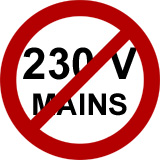|
It couldn't be easier ... just do as you're told. |
|
All must accept that
Emergency practice nets are supposed to be taken seriously and are highly-structured exercises in preparation for providing formal, succinct traffic handling to a professional standard in the event of an emergency. They are not a platform for moronic ego-trippers to display their chaotic ignorance. To ensure traffic and practice nets run smoothly, the rules are clearly stated by the Net Control Station during the introduction to every exercise. Checking-in to such nets deems you have accepted the rules in totality and are entering into a formal contract to comply with all commands from the Net Control Station.
1. LISTEN to
the instructions issued by the NCS in his opening b) If you want to be taken seriously, give out ONLY the data requested by the NCS, in exactly the stipulated order, c) Do not add any other material, technical or otherwise, unless specifically requested.
2. DO NOT
check-in to an emergency practice net if any of your station equipment
Communication during the net, whether with the NCS or while relaying for another station, must be conducted using only a back-up power source (in any of its many forms). The NCS does not need to know how you're doing it, just do it ... otherwise you are clearly not taking the net seriously. Back up power is the DEFAULT. Only the really stupid, and believe it or not there are a few, run their equipment on mains electricity then proudly announce to the whole net without shame or apology their blatant flouting of the 'NO MAINS' rule. Such egregious behaviour beggars belief.
Be advised, your behaviour during emergency-net exercises will provide the Net Control Station and observers with a very good indication of: 1. Your level of self discipline, respect for the NCS and net protocols; 2. How you are most likely to respond to instructions in a real emergency;
3. Whether you have a
potentially-damaging laissez-faire attitude, or are more
likely to
4. To demonstrate your
practical value as a team member, you will need to follow all
5. Take responsibility
for every part of your transmissions and accept all opportunities
The observations and comments here may not be to everyone's
liking. Well tough, the truth is rarely
a welcome visitor in these days of universal entitlement,
woke sensitivities and inflated egos. Observations and comments
are entirely the work of this
webmaster, but based upon the intention of less-explicitly described
rules elsewhere, then paraphrased and expanded to make their
importance much clearer. The wording is quite deliberate and reiterates the rules for those who have repeatedly shown an innate inability to understand plain English. Obedience is very important! In a real emergency, communications must be conducted efficiently rather than in an unstructured, confused manner - lives may well depend upon the radio operator's ability to follow instructions.
Our hobby is often referred to colloquially as 'CB',
and although such denigration is often well-deserved since standards have
been allowed to drop so incredibly low, that does not mean some of us
should not conduct our operations in the professional and
qualified
manner of a real Amateur Radio operator.
If you don't like the rules then please don't waste everyone's time by checking-in.
All must accept that
|
